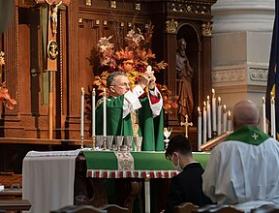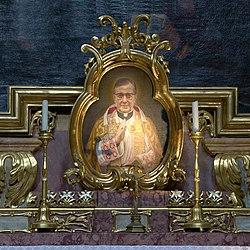
To join the discussion about Gay and Catholic, or to order a copy, go here.
I know a lot of people who are gay and Catholic, on both sides of the altar. Contrary to the media yammerings, being Gay and Catholic is something of a commonplace.
I’ve never personally known someone who was Catholic and gay who hated the Church the way that we hear they should. What I have seen is a number of people who are doing just like so many Catholics. They are obedient to the Church’s teachings to varying degrees, but they are sincere to the core in their longing for the transcendent love of God.
I know gay Catholics who are in loving sexual relationships. I know gay Catholics who have lived their lives and almost certainly will die in the closet. I know gay Catholics who have marriages, children, grandchildren and who live two lives, a secret one as gay and the one they present to the world and to their families as straight. I know gay Catholics who are single and, so far as I can tell, living celebate lives.
What I haven’t known until I came to Patheos was gay Catholics who openly discussed their sexuality in terms of their acceptance of the teachings of Catholic Church. I had not met the willingness to discuss their own gay-ness within an intellectual and lived framework of obedience to Christ in an open and honest way.
I had not, in short, met Eve Tushnet.
Eve, whether she puts it in these words or not, is striving toward the wonderful objective that Margaret Rose Realy states so beautifully, “Being pleasing to God.”
Margaret’s faith and her elucidation of that message have been a beacon to me in these days of my retreat, a light showing the way forward. When I read Eve Tushnet’s book, Gay and Catholic, I recognized that I was reading the message of a person who is also striving to “be pleasing to God” with her life.
There is no one story for how to apply the love and lordship of Christ to our lives. Each one of us has our uniqueness which we bring to that way of living. But “being pleasing to God” must — must — begin with accepting that Christ is the Lord of all life, and most particularly and most demandingly, of our own lives.
Jesus does not force us to follow HIm. He lets us choose. He lets us say no. He even, just as He did during His passion, lets us mock Him and attack Him and deny Him.
We chose to follow Christ, to make Him the Lord of our lives, each of us, of our own free will. Or we refuse.
Obfuscations and claims of following Christ without actual followership do not count in this choice. What matters is if you actually live out that choice on a daily basis. That means living lives that are profoundly counter-cultural. It does not matter what your culture is, you will not “fit” with its worldly zeitgeist if Jesus Christ is truly and absolutely the Lord of your life. It is not possible.
In that way, Eve Tushnet’s decision to accept a celebate life is no different from the many decisions that Christians all over the world must make. It certainly is not so fraught as the decisions to follow Him that Christians who are imprisoned and murdered for their faith are forced to make.
But the decision to give up her will for His will is Eve Tushnet’s gift of herself to Christ.
That, at bottom, is what accepting Jesus Christ as Lord means. It means making a free gift of yourself and your choices to Him. It is not possible to make such a radical commitment to Christ and still be comfortably aligned with the world. In this way, gay Catholics face the same choices as all other followers of Christ.
Eve Tushnet seeks to develop a paradigm of friendship as a way to live out the vocation of celebacy without inflicting the aridity of isolation and loneliness on oneself. In truth, friendships are the elixir of life, and once again, that applies to all of us. Katrina Fernandez, who struggles with the loneliness of a single mother, is just as much in need of loving friendships as the gay Catholic sitting in the pew in front of her.
Friendship, real friendship, is a lost art in our culture of immediate satisfactions and raging political divisiveness. That is a tragedy which reflects our deeper alienation from God.
I say this because the more you love God and the longer you walk with Christ, the more fully you see that we are all the same underneath our artificial differences. We are all scared and alone, pitted and stained, lost and isolated. We all crave the infinite and we all need forgiveness and love.
The rageful craziness of our society as it plunges into a steepening descent, is a manifestation of what happens when people seek these things inside themselves instead of finding them in God.
The antidote to this raw, keening alienation is the complete freedom of accepting that Jesus Christ is Lord, and by that I mean, that Jesus Christ is Lord of you.
For the gay person, no less or even no different, from the rest of us, that means laying the whole of ourselves, including our sexuality, on the altar of His love. But that does not mean that gay people should live lives of solitary confinement inside their gayness.
We were made by a triune God Who understands fellowship, Who made us for fellowship, with one another and with Him.
In Gay and Catholic, Eve Tushnet begins the discussion about how this fellowship might look for a celebate gay Catholic. I don’t think her suggestions are the final discussion about this. I think they are the beginning of a great dialogue, which, if it is to be truly meaningful, must be based on the acknowledgement that this need applies to far more people than just those with homosexual orientation. It is a human discussion, about universal human needs.
We were made for God, and for one another. Friendship is a human need that is probably stronger and certainly more persistent than our sexual longings.
I like Gay and Catholic so much that I’ve bought copies to give to gay Catholic friends of mine. I am interrupting my retreat to write this review because I think that Gay and Catholic begins a discussion that is long overdue and which we desperately need to have.












